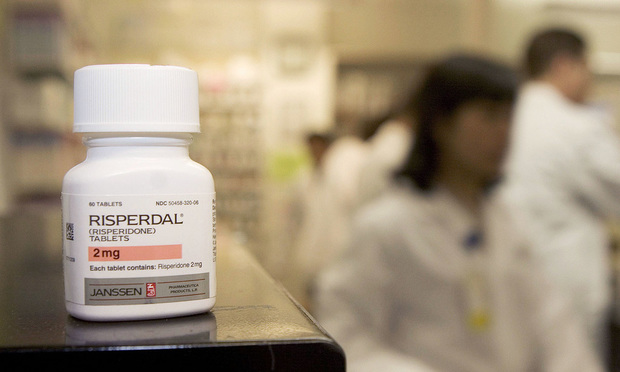Pa. Superior Court Calls for New Trial in Risperdal Case Tossed by Trial Judge
A unanimous three-judge panel of the Pennsylvania Superior Court on Tuesday reversed an order that granted a motion for nonsuit in the case T.M. v. Janssen Pharmaceuticals, and remanded the case to the Philadelphia Court of Common Pleas for a new trial.
July 17, 2019 at 05:07 PM
4 minute read
 Risperdal bottle on the shelf inside a Cambridge, Massachusetts pharmacy. Photo: JB Reed/Bloomberg
Risperdal bottle on the shelf inside a Cambridge, Massachusetts pharmacy. Photo: JB Reed/Bloomberg
A Risperdal case that was dismissed midtrial in 2016 has been reinstated by a Pennsylvania appellate court.
A unanimous three-judge panel of the Pennsylvania Superior Court on Tuesday reversed an order that granted a motion for nonsuit in the case T.M. v. Janssen Pharmaceuticals, and remanded the case to the Philadelphia Court of Common Pleas for a new trial.
The trial court judge who dismissed the case in December 2016 did so after determining that the plaintiffs failed to provide sufficient evidence under Texas products liability law to support a key expert's causation testimony. The Superior Court, however, determined that, although the parties agreed to apply Texas law to the substantive issues in the case, the trial court should have evaluated the issue under Pennsylvania law since the threshold issue of the reliability of the evidence supporting the expert's testimony is a procedural question.
Viewing the reliability and admissibility of the evidence under Pennsylvania law showed that the plaintiffs had indeed provided sufficient evidence to overcome the non-suit motion, Judge Mary Jane Bowes said.
“Viewing the foregoing evidence in the light most favorable to the plaintiffs, we find it was legally sufficient under Pennsylvania law to make out a prima facie case for the jury under Texas substantive law governing failure to warn,” Bowes, who wrote the panel's 35-page opinion, said.
In a statement, leading attorneys in the consolidated Risperdal litigation, Thomas Kline and Charles “Chip” Becker of Kline & Specter and Arnold & Itkin attorney Jason Itkin, said, “The court's comprehensive opinion sets the stage for a jury to decide this case. Our clients look forward to that opportunity.”
T.M. is one of more than 7,000 cases pending in the Philadelphia Court of Common Pleas alleging that Johnson & Johnson subsidiary Janssen failed to properly warn about the risks of the antipsychotic drug Risperdal. The plaintiffs are alleging that the medication led to a condition known as gynecomastia, which is the growth of excessive breast tissue in young men and boys.
According to Bowes, who was joined in Tuesday's ruling by Judges Victor P. Stabile and Maria McLaughlin, at the close of the plaintiff's case in the T.M. trial, Janssen made a motion for nonsuit. The company contended that the plaintiff's causation expert, Dr. Mark P. Solomon, did not meet the causation requirements for scientific reliability under Texas law.
The plaintiffs countered that Texas standards governing the reliability of scientific evidence under Texas law was a procedural issue, and so the court should follow Pennsylvania law, which adheres to the standard outlined in Frye v. United States.
Philadelphia Court of Common Pleas Judge Sean Kennedy agreed with Janssen and dismissed T.M. based on his determination that Solomon's testimony was inadequate.
According to a transcript of proceedings, in dismissing the case, Kennedy said, “At the conclusion of my research and my staff's research, it is my opinion that under Texas law, Dr. Solomon's testimony is legally insufficient to prove causation in this case, and as such, I am granting defendant's motion for compulsory nonsuit.”
Bowes, however, determined that Pennsylvania law applied on the procedural issue about the reliability of the causation evidence, and further determined that the plaintiff provided sufficient evidence to survive non-suit based on Texas substantive law.
“A non-suit is proper only if the plaintiff has not introduced sufficient evidence to establish the necessary elements to maintain a cause of action,” Bowes said. “Viewing all of the evidence in the light most favorable to the plaintiffs, we conclude the evidence was sufficient to make out a prima facie failure-to-warn case based on Texas substantive law.”
A spokeswoman for Janssen did not return a message seeking comment.
This content has been archived. It is available through our partners, LexisNexis® and Bloomberg Law.
To view this content, please continue to their sites.
Not a Lexis Subscriber?
Subscribe Now
Not a Bloomberg Law Subscriber?
Subscribe Now
NOT FOR REPRINT
© 2025 ALM Global, LLC, All Rights Reserved. Request academic re-use from www.copyright.com. All other uses, submit a request to [email protected]. For more information visit Asset & Logo Licensing.
You Might Like
View All
'Discordant Dots': Why Phila. Zantac Judge Rejected Bid for His Recusal
3 minute read
Pittsburgh Jury Tries to Award $22M Against J&J in Talc Case Despite Handing Up Defense Verdict
4 minute read
Plaintiffs Seek Redo of First Trial Over Medical Device Plant's Emissions
4 minute read
Trending Stories
- 1Settlement Allows Spouses of U.S. Citizens to Reopen Removal Proceedings
- 2CFPB Resolves Flurry of Enforcement Actions in Biden's Final Week
- 3Judge Orders SoCal Edison to Preserve Evidence Relating to Los Angeles Wildfires
- 4Legal Community Luminaries Honored at New York State Bar Association’s Annual Meeting
- 5The Week in Data Jan. 21: A Look at Legal Industry Trends by the Numbers
Who Got The Work
J. Brugh Lower of Gibbons has entered an appearance for industrial equipment supplier Devco Corporation in a pending trademark infringement lawsuit. The suit, accusing the defendant of selling knock-off Graco products, was filed Dec. 18 in New Jersey District Court by Rivkin Radler on behalf of Graco Inc. and Graco Minnesota. The case, assigned to U.S. District Judge Zahid N. Quraishi, is 3:24-cv-11294, Graco Inc. et al v. Devco Corporation.
Who Got The Work
Rebecca Maller-Stein and Kent A. Yalowitz of Arnold & Porter Kaye Scholer have entered their appearances for Hanaco Venture Capital and its executives, Lior Prosor and David Frankel, in a pending securities lawsuit. The action, filed on Dec. 24 in New York Southern District Court by Zell, Aron & Co. on behalf of Goldeneye Advisors, accuses the defendants of negligently and fraudulently managing the plaintiff's $1 million investment. The case, assigned to U.S. District Judge Vernon S. Broderick, is 1:24-cv-09918, Goldeneye Advisors, LLC v. Hanaco Venture Capital, Ltd. et al.
Who Got The Work
Attorneys from A&O Shearman has stepped in as defense counsel for Toronto-Dominion Bank and other defendants in a pending securities class action. The suit, filed Dec. 11 in New York Southern District Court by Bleichmar Fonti & Auld, accuses the defendants of concealing the bank's 'pervasive' deficiencies in regards to its compliance with the Bank Secrecy Act and the quality of its anti-money laundering controls. The case, assigned to U.S. District Judge Arun Subramanian, is 1:24-cv-09445, Gonzalez v. The Toronto-Dominion Bank et al.
Who Got The Work
Crown Castle International, a Pennsylvania company providing shared communications infrastructure, has turned to Luke D. Wolf of Gordon Rees Scully Mansukhani to fend off a pending breach-of-contract lawsuit. The court action, filed Nov. 25 in Michigan Eastern District Court by Hooper Hathaway PC on behalf of The Town Residences LLC, accuses Crown Castle of failing to transfer approximately $30,000 in utility payments from T-Mobile in breach of a roof-top lease and assignment agreement. The case, assigned to U.S. District Judge Susan K. Declercq, is 2:24-cv-13131, The Town Residences LLC v. T-Mobile US, Inc. et al.
Who Got The Work
Wilfred P. Coronato and Daniel M. Schwartz of McCarter & English have stepped in as defense counsel to Electrolux Home Products Inc. in a pending product liability lawsuit. The court action, filed Nov. 26 in New York Eastern District Court by Poulos Lopiccolo PC and Nagel Rice LLP on behalf of David Stern, alleges that the defendant's refrigerators’ drawers and shelving repeatedly break and fall apart within months after purchase. The case, assigned to U.S. District Judge Joan M. Azrack, is 2:24-cv-08204, Stern v. Electrolux Home Products, Inc.
Featured Firms
Law Offices of Gary Martin Hays & Associates, P.C.
(470) 294-1674
Law Offices of Mark E. Salomone
(857) 444-6468
Smith & Hassler
(713) 739-1250





